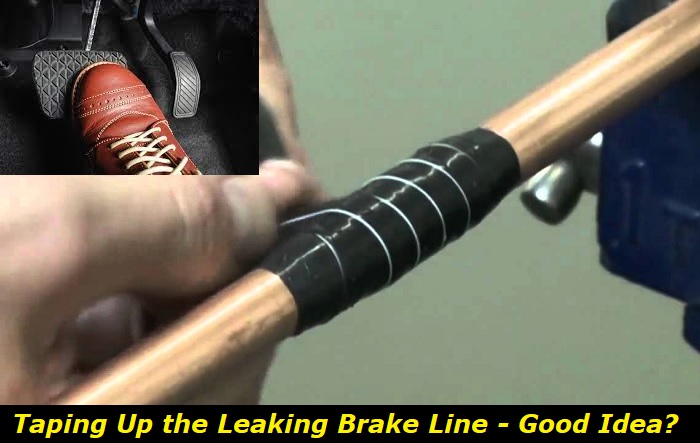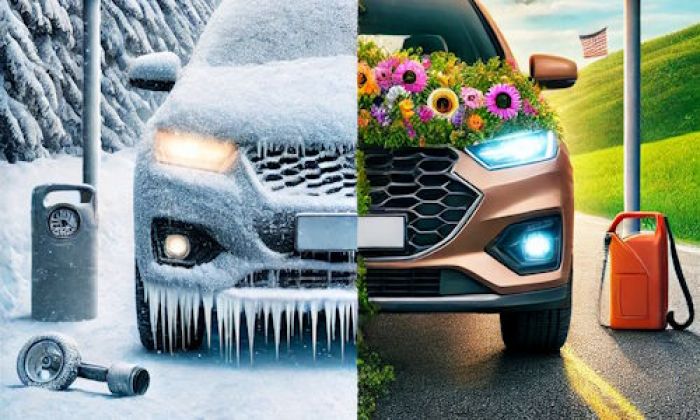If you repair the brake line with the tape, you are risking losing the brakes one day and hitting a pedestrian or another car and probably killing someone. What's more, you will be proven guilty of this and will most likely go to prison if you do this because your car had a serious technical problem that you were aware of and didn't give a damn about it.
Brake fluid problems highlights
- Level of urgency:super-urgent
- DIY diagnostics:usually,impossible
- DIY repairs:impossible
- Price for repair:$250 - $650
- Common symptoms:pedal goes to the floor, braking efficiency low, leaks
- Commonreasons:brake lines leaking, low fluid,badfluid
- If ignored:no brakes, getting into accidents, poor safety when driving

Is there a temporary brake line repair?
When I was preparing materials for this article, I just looked on YouTube for some tutorials and I was shocked to get hundreds of them showing how to tape the brake line. I believe all those bloggers should go to court because their advice may literally kill people!
There is no temporary repair for a leaking brake line. If it starts leaking, the only possible thing to repair the line is to replace the line. Alternatively, you can also use soldering techniques as a temporary repair. But the trick is that replacing the line is always easier and cheaper than soldering the old leaky line.
Sometimes, when the leak is not in the broken line but in the broken connection, you may take the connection apart and see if there is a way to repair it. Maybe just tightening the connector will fix the issue for some time and you will be able to carefully drive.
But the best way to deal with a car that has a leaking brake line is to call a tow truck and get this car towed to the dealership or to a trusted repair shop.
Can you drive a car with a leaking brake line?
You may have heard that there are usually two separate systems in the braking system. In most cars, they are arranged in the X-pattern. So, one system controls the front left and rear right wheels while the other one controls the front right and the rear left wheels.
So, you may think that when something is leaking in this system, the other contour of the braking line is working and you can drive. The thing is that both systems take brake fluid from the same reservoir. And once it leaks, the fluid level in the reservoir will start going down. When it goes down too much, the second line will stop working, too.
You will need about 2-3 minutes for the critical amount of brake fluid to leak out. So, there is no way you can safely drive when something is leaking in the braking system of your car. Whenever you locate this problem, avoid driving your car.
What about the tapes advertised to seal the brake system lines?
Now, you may have heard that people repaired their brake lines with some kind of tape and successfully drove to their destinations. Someone even tried to drive like this for a long time. I warn you - this is NOT SAFE. This is extremely dangerous.
Even if some duct tape is strong enough to hold the extreme pressure in the system, it's not going to hold it for a long time. And you can't even predict how short this time will be.
Here's what happens:
- once you apply the tape and press the brakes, you may see that there is no leak right now;
- but the leaking spot will still supply the duct tape with some brake fluid;
- the brake fluid will quickly dissolve the glue that holds the tape in place;
- after that, the tape will start losing its properties and will finally stop holding the pressure;
- it's going to be the same with all kinds of sticky tapes you may come up with;
- after several minutes, they will not hold the brake fluid and the leak will open again.
So, it's not about the long-term result of repairing the brake line leak. It's about how many minutes this tape is going to block the leakage. And I believe it's not worth the effort.
Many people in the comments and private messages, ask me what kind of tape I can advise to repair brake line leaks. Here's my official answer: there is no way you can tape up this problem, it needs proper inspection and repairs. Without this, driving your car may be deadly dangerous whatever "temporary" methods to deal with the leak you may come up with.
What if your brake line leaks in the middle of nowhere?
You may have read this article with the expectation of getting some alternative quick repair methods. People may have got into problems with their brakes leaking between cities, in the middle of nowhere. And I perfectly understand your feelings about that.
But still, I can't offer any quick solutions. There are two possible solutions in this case:
1) Call a roadside assistance. You may even call your dealer and ask if they have this service. If your car is under warranty, towing or repair will be free for you. If the warranty period is over, you better find an independent roadside assistance service - it will cost less.
2) Call a tow truck. Even though it's going to cost you several hundred dollars, it's still cheaper and better than risking your life. So, call a tow truck and have your vehicle delivered to the nearest shop that can help you.
You may have heard some advice telling you that it's OK to drive a car at 5 MPH using only the handbrake to stop when needed. I should tell you that this is going to take you a lot of time and also it's not OK for cities with some traffic. Anyway, you will be risking and this risk isn't worth the money you will pay for a tow truck.
How to repair a leaking brake line in your car?
Now, let's see how exactly you can repair the car if you spot the leaking brake line. It appears to be pretty complicated because the brake lines are usually long and tangled. They are very hard to take out and then install back into the vehicle.
Of course, replacement of the leaking line is the only way to solve the problem. Here's how it should be done:
- first of all, you should find the proper brake line - it's strongly recommended to buy only the OEM one;
- also, you will need proper brake fluid because there will be a need to top up the fluid in the reservoir;
- it's a good idea to go to the shop to have this thing done, the DIY job is going to be extremely complicated;
- if you still want to do it on your own, find the proper tightening power of the connections and get the needed tools for this;
- when the new line is in its place, you will also need to top up the fluid and pump the brakes;
- only after properly pumping the brakes, you may try driving the car;
- it's recommended to check visually the brake fluid level every day after you replace the brake line.
As you see, it's important to know several technical things about how the brake line should be assembled in your car. Overtightening the fittings will lead to new leaks very soon. Poorly tightened fasteners will show minor leaks right after you press the brake pedal for the first time after the repairs.
Final thoughts
I perfectly understand your wish to repair the small leak in the brake line just by using some type of magical duct tape. But it's not going to work. There is nothing to argue about - just don't do that at all. Never.
The only proper way to repair a leaking brake line is to replace it with a new one. Also, analyze why this may have happened and what exactly you may need to do to avoid this problem in the future.
Be careful - the brakes are super important in your vehicle and should only be repaired by professionals! Never drive your car if you suspect that something is wrong with the brakes!
About the authors
The CarAraC research team is composed of seasoned auto mechanics and automotive industry professionals, including individuals with advanced degrees and certifications in their field. Our team members boast prestigious credentials, reflecting their extensive knowledge and skills. These qualifications include: IMI: Institute of the Motor Industry, ASE-Certified Master Automobile Technicians; Coventry University, Graduate of MA in Automotive Journalism; Politecnico di Torino, Italy, MS Automotive Engineering; Ss. Cyril and Methodius University in Skopje, Mechanical University in Skopje; TOC Automotive College; DHA Suffa University, Department of Mechanical Engineering






Add comment